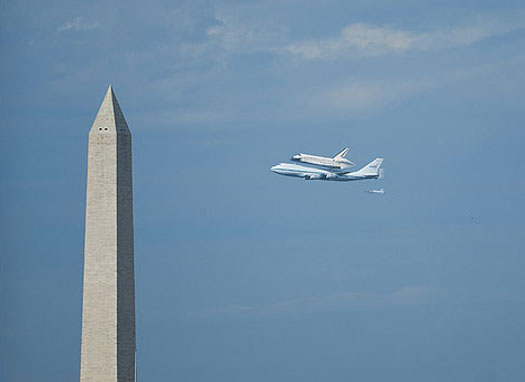A funeral procession.

Photo by Douglas Graham/Roll Call
Click here to listen to the broadcast of You Tell Me on KTBB AM 600, Friday, May 04, 2012.
Did you watch in April as Space Shuttle Discovery did a flyby over the National Mall to the delight of thousands of people standing in awe on the ground? I did. And I confess to having done a bit of slow burn on this story.
Last month, NASA delivered two shuttles to the museums where they will be put on display. Discovery went to the Air & Space Museum annex near Washington’s Dulles Airport and the test article Enterprise went to New York to be displayed at the Intrepid Sea, Air & Space Museum on the west side of Manhattan.
NASA did its best to dress these deliveries up as victory laps for the two vehicles. But as stirring as it was to see Discovery set against the backdrop of our country’s most revered monuments, and to see Enterprise set against the backdrop of New York City and the Statue of Liberty, these were neither one victory laps.
Each was a funeral procession — with the 747 that carried the shuttles acting as a hearse.
The shuttle program had to end sometime. The program has arguably run its course and has done so to decidedly mixed reviews.
In its 30 years of flying the shuttle program delivered some stunning images and some breathtaking achievements. Still, it never lived up to its initial promise of cheap, reliable access to space. Each shuttle launch cost in excess of a billion dollars and the losses of Challenger in 1986 and Columbia in 2003 raised legitimate questions as to the orbiters’ reliability and safety.
But as legendary Texas Longhorns football coach Darrell Royal once said, “Ol’ ugly is better’n ol’ nothin’.” And what we have now is ol’ nothin’.
May 5 marks the 51st anniversary of the launch of Freedom 7 carrying Alan Shepard. It was America’s first attempt to put a man into space and though it was riveting, it really didn’t amount to much. Shepard was launched atop a tiny little Redstone missile for a 15 minute lob out into the Atlantic Ocean 150 miles or so east of Cape Canaveral.
As modest as that flight was, a half century later the erstwhile leader in space is utterly incapable of repeating it.
Ol’ nothin’ with respect to U.S. manned space flight is a first for most Americans. Two out of three Americans alive today have always lived in a country that was the undisputed leader in manned space flight.
But no more. And therein lies the crime. It’s not in ending the shuttle program. The crime lies in having no successor.
The Constellation program, launched under President Bush and intended to be the next generation vehicle for access to Earth orbit and beyond, was abruptly cancelled in 2010 by President Obama. In cancelling Constellation, Obama cited the country’s precarious finances.
Now there’s irony for you. The most profligate president in the history of the republic is stricken with a fit of fiscal rectitude. But only when it concerns an area of clear American leadership and a program that actually is more appropriately the province of government than the private sector.
The administration’s money argument is a canard. The fiscal impact of ending NASA’s manned space program will only be known when the cost of allowing NASA’s engineers, technicians and managers to scatter to the four winds – taking 60 years of accumulated experience and expertise with them – is taken into account.
When America was spending 20 percent of its GDP on government, it had money for Apollo’s missions to the moon. But now at 26 percent of GDP, government has no money for even the most basic flight into low Earth orbit (other than to pay $55 million a pop to thumb a ride on Russia’s Soyuz).
Russia and China are not retreating from space. China has announced that it intends to land men on the moon by 2025. (How heavily are you willing to bet against them?)
But the United States is retreating, willfully and unnecessarily. Retreat from leadership always comes at a price and believe me, due note of our retreat has been taken by our enemies.
And by our friends.








Hear Hear!! But all is not lost Paul Nasa’s new mission of Muslim outreach sounds so exciting, we might even get a bang out of it!!
It is okay to “give” money to the muslim brotherhood. It is okay to give money, as bail outs, to companies such as solendra and other “green” companies…money we have to BORROW to GIVE away, yet we do not have money for a space program?
We all know where this borrowed money is going…right into obama’s re-election coffers!
Dumping the space program is just another tactic of obama to put us in our place around the world!
obama needs to be put in HIS place…OUT OF THE WHITEHOUSE!
Paul sounds like he is becoming a free spending lib. We don’t need to sink money into a space program, let free enterprise do it. Richard Branson can jandle it. I’d rather pay down debt. But if we HAVE to spend on a porgram to keep Mr. Gleiser happy lets spend it on the oceans or on developing grasses as asupplemental fule to oil, on more LNG stations. I’m kind of sad that Paul feels the need to spend money.
I’m just curious about something. Thirty years ago, spending on infrastructure would have undoubedly included funding for improvement of telephone wires, poles, and communication centers. Now that satelite technology is a requirement for modern communication, how in the world (no space pun intended) is the space program not considered essential for modern day infrastructure spending?